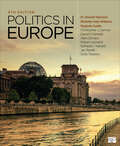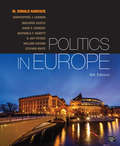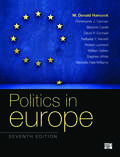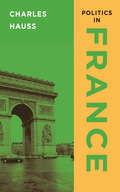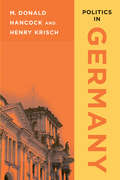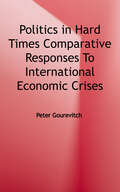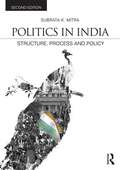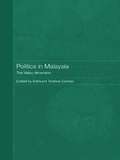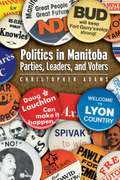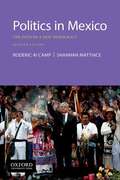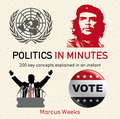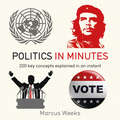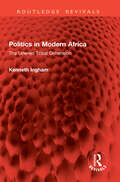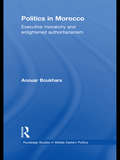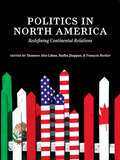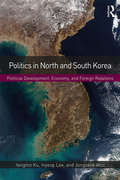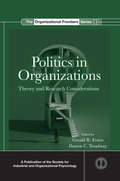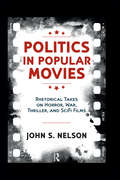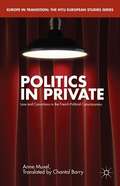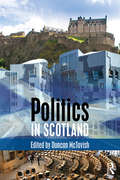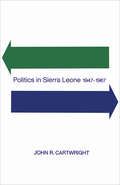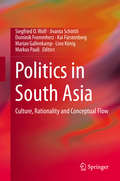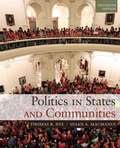- Table View
- List View
Politics in Europe
by Jan Teorell Alan Convery M. Donald Hancock Michelle H. Williams Marjorie Castle Christopher J. Carman David P. Conradt Robert Leonardi Raffaella Y. Nanetti Sofia TipaldouPolitics in Europe introduces students to the power of the EU and seven political systems—the UK, France, Germany, Italy, Sweden, Russia, and Poland—while addressing key social and political issues including globalization, terrorism, immigration, gender, and religion. Packed with robust country descriptions from regional specialists, the Eighth Edition encourages critical thinking and meaningful cross-national comparisons.
Politics in Europe
by David P. Conradt Robert Leonardi Raffaella Y. Nanetti M. Donald Hancock Christopher J. Carman Marjorie Castle William N. Safran Stephen L. WhiteThoroughly updated, this sixth edition of Hancock et al.’s Politics in Europe remains an approachable yet rigorous introduction to the region—the UK, France, Germany, Italy, Sweden, Russia, Poland, and the European Union. Its strong analytic framework and organization, coupled with detailed country coverage written by country experts, ensure that students not only get a robust introduction to each country, but also are able to make meaningful cross-national comparisons. Key updates include the latest in European politics, including recent election results, the content and impact of the Eurozone crisis, the emergence of a new “Nordic model” of welfare capitalism, and coverage of key social and political issues including globalization, terrorism, immigration, gender, religion, and transatlantic relations.
Politics in Europe
by David P. Conradt Robert Leonardi Raffaella Y. Nanetti M. Donald Hancock Christopher J. Carman Marjorie Castle William N. Safran Stephen L. WhiteThoroughly updated, this sixth edition of Hancock et al.’s Politics in Europe remains an approachable yet rigorous introduction to the region—the UK, France, Germany, Italy, Sweden, Russia, Poland, and the European Union. Its strong analytic framework and organization, coupled with detailed country coverage written by country experts, ensure that students not only get a robust introduction to each country, but also are able to make meaningful cross-national comparisons. Key updates include the latest in European politics, including recent election results, the content and impact of the Eurozone crisis, the emergence of a new “Nordic model” of welfare capitalism, and coverage of key social and political issues including globalization, terrorism, immigration, gender, religion, and transatlantic relations.
Politics in Europe: An Introduction To The Politics Of The United Kingdom, France, Germany, Italy, Sweden, Russia, And The European Union (Studies In Russia And East Europe Ser.)
by David P. Conradt Robert Leonardi Raffaella Y. Nanetti M. Donald Hancock Christopher J. Carman Marjorie Castle William N. Safran Stephen L. White Professor Michelle H. Williams Professor Mary N. HamptonPolitics in Europe, Seventh Edition introduces students to the power of the European Union as well as seven political systems—the UK, France, Germany, Italy, Sweden, Russia, Poland—within a common analytical framework that enables students to conduct both single-case and cross-national analysis. Each case addresses the most relevant questions of comparative political analysis: who governs, on behalf of what values, with the collaboration of what groups, in the face of what kind of opposition, and with what socioeconomic and political consequences? Packed with captivating photos and robust country descriptions from regional specialists, the Seventh Edition enables students to think critically about these questions and make meaningful cross-national comparisons.
Politics in Europe: An Introduction To The Politics Of The United Kingdom, France, Germany, Italy, Sweden, Russia, And The European Union (Studies In Russia And East Europe Ser.)
by David P. Conradt Robert Leonardi Raffaella Y. Nanetti M. Donald Hancock Christopher J. Carman Marjorie Castle William N. Safran Stephen L. White Professor Michelle H. Williams Professor Mary N. HamptonPolitics in Europe, Seventh Edition introduces students to the power of the European Union as well as seven political systems—the UK, France, Germany, Italy, Sweden, Russia, Poland—within a common analytical framework that enables students to conduct both single-case and cross-national analysis. Each case addresses the most relevant questions of comparative political analysis: who governs, on behalf of what values, with the collaboration of what groups, in the face of what kind of opposition, and with what socioeconomic and political consequences? Packed with captivating photos and robust country descriptions from regional specialists, the Seventh Edition enables students to think critically about these questions and make meaningful cross-national comparisons.
Politics in France
by Charles HaussFrance has shifted toward more “normal” politics since the mid 1960s. That’s saying a lot for a country that has had three monarchies, five republics, two empires, and a neo-fascist regime in the years since its revolution in 1789. Hauss’s lively and up-to-date new text looks beyond “de Gaulle’s revolution,” tracing France’s historical development up to the present and describing with fresh insight its political culture, parties, interest groups, and institutional system, as well as its place in the EU and the larger global economic order. Hauss offers lively analysis of recent events and issues, including the May 2007 presidential elections; hot-button policy issues like immigration and the assimilation of non-Westerners into the French cultural and political landscape and the impact of the EU on France’s economic policies.Adopt together with Politics in Britain and Politics in Germany and pass savings along to your students.For pricing and ordering information, please contact us at mailto:collegesales@cqpress.com
Politics in Germany
by M. Donald Hancock Henry KrischTake a sneak peak inside!Click on the links below to preview the Introduction and Chapter 1. Order your exam copy today by clicking on the "Request an Exam Copy" link above.IntroductionChapter 1Germans born in the second decade of the last century will have been a subject of no less than six political regimes, seven if they lived in the former German Democratic Republic. Today, Germany’s democratic polity, pluralistic society, institutional structures, and market economy are growing increasingly strong. In clear and compelling prose, Hancock and Krisch argue that German politics today is the politics of a “normal” European democracy moving toward the EU. The authors discuss Germany’s course of modernization, which involves rapid industrialization and social development following the nation’s first unification in 1871 and its subsequent torturous course of political change embracing Imperial authoritarianism, the democratic experiment of the Weimar Republic, Nazi totalitarianism, and postwar variants of communism and Western-style democracy. Chapters detail the country’s political history, as well as its culture, new constitutional debates, parties, and economic policy, and culminate in a look at Germany in global context.Adopt together with Politics in Britain and Politics in France and pass savings along to your students.For pricing and ordering information, please contact us at mailto:collegesales@cqpress.com
Politics in Hard Times: Comparative Responses to International Economic Crises (Cornell Studies In Political Economy)
by Peter GourevitchIn this book, the author explores the common political factors that shape economic policy choices. He focuses on three periods of economic crisis--1873-1896, 1929-1949, and 1971 to the present--and compares policy choices made in Britain, France, Germany, Sweden, and the United States.
Politics in India: Structure, Process and Policy (Moderne Sudasienstudien / Modern South Asian Studies #5)
by Subrata K. MitraThe second edition of this textbook brings together general political theory and the comparative method to interpret socio-political phenomena and issues that have occupied the Indian state and society since 1947. It considers the progress that India has made in some of the most challenging aspects of post-colonial politics such as governance, democracy, economic growth, welfare, and citizenship. Looking at the changed global role of India, its standing in the G-20 and BRICS, as well as the implications of the 2014 Indian general elections for state and society, this updated edition also includes sections on the changing socio-political status of women in India, corruption and terrorism. The author raises several key questions relevant to Indian politics, including: • Why has India succeeded in making a relatively peaceful transition from colonial rule to a resilient, multi-party democracy in contrast to its South Asian neighbours? • How has the interaction of modern politics and traditional society contributed to the resilience of post-colonial democracy? • How did India’s economy moribund—for several decades following Independence—make a breakthrough into rapid growth and can India sustain it? • And finally, why have collective identity and nationhood emerged as the core issues for India in the twenty-first century and with what implications for Indian democracy? The textbook goes beyond India by asking about the implications of the Indian case for the general and comparative theory of the post-colonial state. The factors which might have caused failures in democracy and governance are analysed and incorporated as variables into a model of democratic governance. In addition to pedagogical features such as text boxes, a set of further readings is provided to guide readers who wish to go beyond the remit of this text. The book will be essential reading for undergraduate students and researchers in South Asian and Asian studies, political science, development studies, sociology, comparative politics and political theory.
Politics in Malaysia: The Malay Dimension (Routledge Malaysian Studies Series #3)
by Edmund Terence GomezExamining some of the most critical issues in Malaysian politics today, including human rights, law and democracy, gender and Islam, this book explores the contours of the contemporary landscape of Malaysian politics, focusing especially on politics among the majority ethnic Malay community. In particular, the book explains why changes in patterns of political mobilization and the rhetoric of the dominant parties - particularly the PAS and UMNO - have been so limited, despite the overt and growing dissatisfaction shown by Malaysians with the state of their political system and the ability of these parties to represent their interests. It considers the recent history of events and discourses within Malaysian society, and UMNO and PAS, and goes on to analyze why important transitions have occurred in society yet political parties have not adapted themselves to these changes and remained reticent about instituting meaningful reforms involving these matters.
Politics in Manitoba: Parties, Leaders, and Voters
by Christopher AdamsPolitics in Manitoba is the first comprehensive review of the Manitoba party system that combines history and contemporary public opinion data to reveal the political and voter trends that have shaped the province of Manitoba over the past 130 years. The book details the histories of the Progressive Conservatives, the Liberals, and the New Democratic Party from 1870 to 2007. Adams looks in particular at the enduring influence of political geography and political culture, as well as the impact of leadership, campaign strategies, organizational resources, and the media on voter preferences. Adams also presents here for the first time public opinion data based on more than 25,000 interviews with Manitobans, conducted between 1999 and 2007. He analyzes voter age, gender, income, education, and geographic location to determine how Manitobans vote. In the process Adams dispels some commonly held beliefs about party supporters and identifies recurring themes in voter behaviour.
Politics in Mexico: The Path of a New Democracy
by Roderic Ai Camp Shannan MattiaceTo address several major changes that have occurred since 2013, including the broad effort of Mexico to achieve a functional democracy; Peoa Nieto's continued reliance on the armed forces to combat organized crime; an analysis of the 2018 presidential election and what Lopez Obrador's victory means for Mexico; and the country's slow economic growth and the importance of emphasizing poverty as a central policy issue.
Politics in Minutes (IN MINUTES)
by Marcus WeeksQuick, accessible, compact guide to understanding key political concepts. Contents include: Liberty, Justice, Equality, Human rights, Social contract, Democracy, Monarchy, Anarchism, Capitalism, Socialism, Nationalism and Globalisation.
Politics in Minutes: 200 Key Concepts Explained In An Instant (In Minutes)
by Marcus WeeksQuick, accessible, compact guide to understanding key political concepts. Contents include: Liberty, Justice, Equality, Human rights, Social contract, Democracy, Monarchy, Anarchism, Capitalism, Socialism, Nationalism and Globalisation.
Politics in Modern Africa: The Uneven Tribal Dimension (Routledge Revivals)
by Kenneth InghamFirst published in 1990, Politics in Modern Africa explores the impact of traditional loyalties (‘tribalism’) on political and economic problems in nine African states-Uganda, Ghana, Nigeria, Kenya, Senegal, Guinea, Zaire, Angola, and Zimbabwe. Professor Kenneth Ingham, a leading historian of modern African history provides a lively introduction to a complex subject, demonstrating that African countries have drawn more deeply upon their inner resources in shaping their political character than is often realised, and that the intensity of traditional loyalty has varied greatly from country to country.This book will be specially useful to students and teachers of African history or politics, and to those on development studies courses.
Politics in Morocco: Executive Monarchy and Enlightened Authoritarianism (Routledge Studies in Middle Eastern Politics)
by Anouar BoukharsDemocratization and the process of political reform is a critical issue in the contemporary Middle East and North Africa. This book looks at the situation in Morocco and examines the role of the monarchy and the relative strengths and weaknesses of the Islamic and secular/liberal groupings campaigning to shape the local politics and society. Politics in Morocco moves beyond the theoretical framework of the transition paradigm to give a thorough analysis of the dynamics of monarchical authoritarian rule and its implications. The author explores the formal and informal working mechanisms of authoritarian rule, the roles and functions of secular opposition forces, and the dynamics of political inclusion of Islamists in the structures of formal contestation. In doing so, he sheds fresh light on how authoritarian rule under King Mohamed VI is maintained and legitimised by a wide array of formal and informal political and social networks. This in-depth investigation of political participation in Morocco offers a new perspective on the issue of democracy and monarchical rule in the Middle East. As such, it will be of great interest to students and scholars of Middle Eastern and North African politics, democratization studies and political Islam.
Politics in North America: Redefining Continental Relations
by Yasmeen Abu-Laban Radha Jhappan Francois RocherIt is no longer sufficient to examine discrete nation-states in isolation from each other. In Politics in North America: Redefining Continental Relations, prominent authors from Canada, the United States, and Mexico explore the politics of redefining the institutional, economic, geographic, and cultural boundaries of North America. The contributors argue that the study of politics in the twenty-first century requires simultaneous attention to all levels (local, national, and international) as well as, increasingly, to continents. This argument is explored through the historical and contemporary social and political forces that have created competing visions of what it means to belong to a North American political community. In this process, new debates emerge in the book concerning the appropriate role for the state, as well as the meaning of sovereignty, democracy, and rights.
Politics in North and South Korea: Political Development, Economy, and Foreign Relations
by Yangmo Ku Inyeop Lee Jongseok WooPolitics in North and South Korea provides students with a comprehensive understanding of the political dynamics of the two Koreas. Giving equal weight to North and South Korea, the authors trace the history of political and economic development and international relations of the Korean peninsula, showing how South Korea became democratized and how Juche ideology has affected the establishment and operation of a totalitarian system in North Korea. Written in a straightforward, jargon free manner, this textbook utilizes both historical-institutional approaches and quantitative evidence to analyse the political dimensions of a wide variety of issues including: Legacies of early-twentieth-century Japanese colonial rule South Korean democratization and democratic consolidation South Korean diplomacy and North Korean nuclear crises The economic development of both North and South Korea The three-generation power succession in North Korea North Korean human rights issues Inter-Korean relations and reunification This textbook will be essential reading for students of Korean Politics and is also suitable for undergraduate and postgraduate courses on East Asian Politics, Asian Studies, and International Relations.
Politics in Organizations: Theory and Research Considerations (SIOP Organizational Frontiers Series)
by Gerald R. Ferris Darren C. TreadwayThis edited volume in the SIOP Frontiers series is one of the first to look at the psychological factors behind politics and power in organizations. Noted contributors from schools of management, psychology, sociology and political science look at the theory, research, methodology and ethical issues related to organizational politics and climates. The book is divided into three parts: Part 1 looks at the historical evolution of the field; Part 2 integrates organizational politics with important organizational behavior constructs and/or areas of inquiry, for example in the chapter by Lisa Leslie and Michele Gelfand which discusses the implications of cross-cultural politics on expatriates and within cross-national mergers; and Part 3 focuses on individual differences and organizational politics, focusing on the nature of political relationships.
Politics in Popular Movies: Rhetorical Takes on Horror, War, Thriller, and Sci-Fi Films (Media and Power)
by John S. NelsonPopular movies can be surprisingly smart about politics - from the portentous politics of state or war, to the grassroots, everyday politics of family, romance, business, church and school. Politics in Popular Movies analyses the politics in many well-known films across four popular genres: horror, war, thriller and science fiction. The book's aims are to appreciate specific movies and their shared forms, to understand their political engagements and to provoke some insightful conversations. The means are loosely related 'film takes' that venture ambitious, playful and engaging arguments on political styles encouraged by recent films. Politics in Popular Movies shows how conspiracy films expose oppressive systems; it explores how various thrillers prefigured American experiences of 9/11 and shaped aspects of the War on Terror; how some horror films embrace new media, while others use ultra-violence to spur political action; it argues that a popular genre is emerging to examine non-linear politics of globalisation, terrorism and more. Finally it analyses the ways in which sci-fi movies reflect populist politics from the Occupy and Tea Party movements, rethink the political foundations of current societies and even remake our cultural images of the future.
Politics in Private
by Anne MuxelHave you ever fallen out with someone close to you over your political ideas or convictions or felt that a personal relationship was damaged because you disagreed about politics? There is no more interesting or diverse country than France to study how our political opinions influence the variety of relationships we engage in throughout our lifetimes. Using a unique approach, Anne Muxel offers a compelling account of the role our political opinions play in all our lives, whether those opinions are held strongly or not. She looks at the bonds between parents and children, brothers and sisters, husbands and wives, friends and colleagues, crossing the full spectrum of human relationships to reveal a brilliantly complex portrait of how politics and the emotions intersect. This book is a must, not just for readers interested in France and in politics but also for all those interested in the complexity of human relationships.
Politics in Scotland
by Duncan McTavishPolitics in Scotland is an authoritative introduction to the contemporary political landscape in Scotland and an essential text for undergraduate and postgraduate students of Scottish Politics. Written by leading experts in the field, it is coherently organised to provide a clear and comprehensive overview of a range of themes in contemporary Scottish Politics. Key topics include: • Government and electoral behaviour. • Representation and political parties in Scotland. • Public policy and Scotland’s relationship with the rest of the world. • Scottish politics both in the run up to and after the 2014 referendum. • The Future of Scottish government and politics. This textbook will be essential reading for students of Scottish politics, British Politics, devolution, government and policy.
Politics in Sierra Leone 1947-1967
by John CartwrightSierra Leona is unique among African states in the extent of its commitment to competition between individuals and parties for political office. Until 1967 it maintained a political system marked by vigorous competition between parties and by numerous opportunities for the expression of diverse and discordant views, despite the fact that the pressures working against "open" politics were no less severe than those found in neighbouring states. The dominant group in Sierra Leone politics from the start of decolonization in 1947 until the military coup of 1967 was the Sierra Leone Peoples Party, a loose coalition based on the common interests of the traditional rulers and the emerging bourgeoisie. Under the first Prime Minister, Sir Milton Margai, this coalition maintained itself against electoral challenges by absorbing leaders of the opposition. However, growing dissatisfaction with the dominant Mende tribe and class discontent with the traditional rulers gradually eroded the position of these groups.In 1967 Sierra Leone passed the critical test of a competitive political system when the opposition party, the All Peoples Congress, defeated the SLPP and was called upon to form a government. This was the first time an opposition party in an independent tropical African state had come to power through the ballot box. Although the peaceful transfer of power was rudely shattered by a military coup, Sierra Leone had already demonstrated how firmly a competitive pattern of politics had been established, and just over a year later, an uprising of enlisted men against their officers restored the lawfully elected government, setting Sierra Leone once again on the path of a peaceful competition under constitutional rules.In this thorough and well-documented study Dr Cartwright explains how Sierra Leone maintained this pattern of political competition. He concludes that the traditionally oriented political leadership was able to maintain its position because of the relatively slow rate of social change outside the political sphere, and because of its own ability to adapt traditional patterns of behaviour to its new needs. He suggests that this traditional orientation played an important role in moderating the use of power by the new leaders and in making their position legitimate in the eyes of the people.Although primarily aimed at political scientists, and particularly those with an interest in African politics, this study is also important to scholars in related disciplines who are interested in the social structures and forces that bear on political activity. Written in a simple, direct style, it can be read and appreciated by anyone who wishes an account of what happened in the politics of one of the most interesting of the English-speaking African states.
Politics in South Asia
by Siegfried O. Wolf Jivanta Schöttli Dominik Frommherz Kai Fürstenberg Marian Gallenkamp Lion König Markus PauliThe book introduces central themes that have preoccupied the field of South Asian politics over the last few decades and identifies new, emerging areas of research. Presenting both general political theory and context-specific case studies, the collection draws attention to the methodological challenges of working on an area-specific theme and the importance of generating generalizable insights linked to theory. Hence it will be of interest for political scientists working on South Asian politics as well as on other non-Western societies. The collection represents an unusually broad survey of scholarship emerging from a range of leading academic centres in the field.
Politics in States and Communities
by Thomas Dye Susan MacManusPolitics in States and Communities is distinguished by its focus on politics, its comparative approach, its concern with thorough explanation, its interest in policy, and its focus on conflicts in states and communities. Several themes are carried on throughout the book that emphasize the importance of politics at the state and community level including the “conflict management” theme which emphasizes the sources and nature of conflict in society, how key decision makers act in conflict situations, and how “politicos” emerge and determine “who gets what.”
